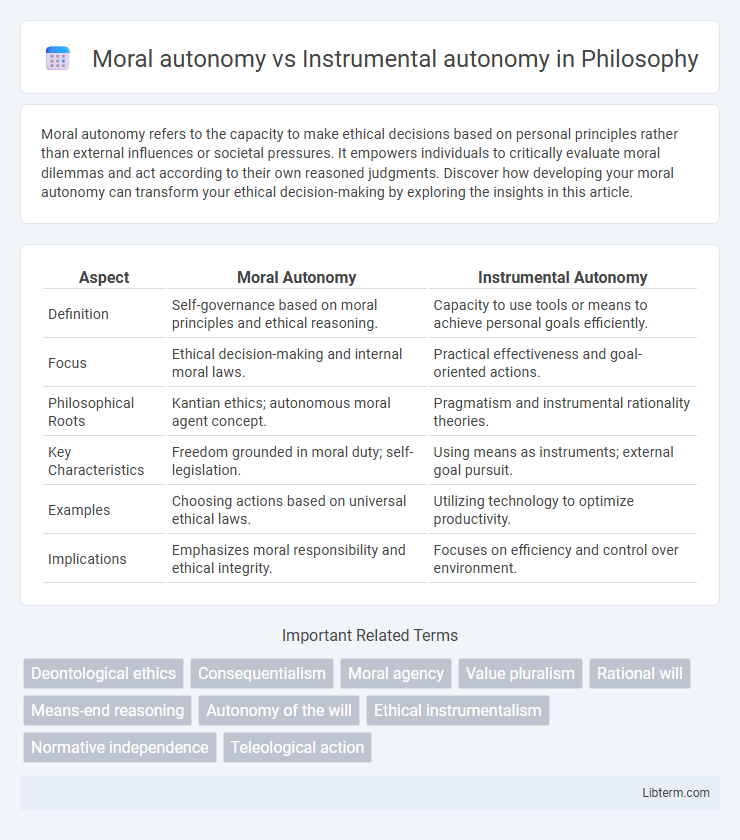Moral autonomy refers to the capacity to make ethical decisions based on personal principles rather than external influences or societal pressures. It empowers individuals to critically evaluate moral dilemmas and act according to their own reasoned judgments. Discover how developing your moral autonomy can transform your ethical decision-making by exploring the insights in this article.
Table of Comparison
| Aspect | Moral Autonomy | Instrumental Autonomy |
|---|---|---|
| Definition | Self-governance based on moral principles and ethical reasoning. | Capacity to use tools or means to achieve personal goals efficiently. |
| Focus | Ethical decision-making and internal moral laws. | Practical effectiveness and goal-oriented actions. |
| Philosophical Roots | Kantian ethics; autonomous moral agent concept. | Pragmatism and instrumental rationality theories. |
| Key Characteristics | Freedom grounded in moral duty; self-legislation. | Using means as instruments; external goal pursuit. |
| Examples | Choosing actions based on universal ethical laws. | Utilizing technology to optimize productivity. |
| Implications | Emphasizes moral responsibility and ethical integrity. | Focuses on efficiency and control over environment. |
Defining Moral Autonomy
Moral autonomy refers to the capacity to make ethical decisions based on internal principles and values, independent of external influences or pressures. It involves self-governance where individuals critically evaluate moral norms and act according to their own reasoned judgments. Defining moral autonomy emphasizes the development of personal responsibility and integrity in ethical decision-making processes.
Understanding Instrumental Autonomy
Instrumental autonomy refers to the capacity to use reason and decision-making skills as tools to achieve specific goals or desires, often emphasizing practicality and efficiency. This form of autonomy prioritizes external ends, where actions are means to personal or social benefits rather than expressions of moral values. Understanding instrumental autonomy involves recognizing how individuals coordinate behavior based on strategic calculation rather than ethical imperatives.
Historical Perspectives on Autonomy
Historical perspectives on autonomy distinguish moral autonomy as the capacity to govern oneself according to ethical principles, rooted in Kantian philosophy, emphasizing self-legislation and moral duty. Instrumental autonomy, contrastingly, emerged from Enlightenment and modern political thought, focusing on the ability to make decisions and take actions to achieve personal goals and practical ends. These evolving concepts reflect shifts in philosophical debates from intrinsic moral self-governance to functional self-determination within social and political frameworks.
Core Differences: Moral vs Instrumental Autonomy
Moral autonomy refers to the capacity to make ethical decisions based on internal principles and values, emphasizing individual moral responsibility and conscience. Instrumental autonomy involves the ability to use tools, methods, or strategies effectively to achieve specific goals, focusing on practical and functional independence. The core difference lies in moral autonomy's alignment with ethical self-governance, while instrumental autonomy centers on efficiency and goal-directed behavior without necessarily involving moral considerations.
Autonomy in Ethical Theories
Moral autonomy emphasizes an individual's ability to make ethical decisions based on internal principles and values, aligning with Kantian ethics which prioritize rational self-governance and moral duty. Instrumental autonomy views autonomy primarily as a means to achieve external goals or purposes, often linked to utilitarian frameworks where actions are justified by their outcomes. Understanding the distinction between moral autonomy and instrumental autonomy is crucial for analyzing autonomy's role in ethical theories, highlighting the tension between self-legislation and goal-oriented behavior.
Autonomy and Personal Decision-Making
Moral autonomy emphasizes the individual's capacity to make decisions based on internal ethical principles, ensuring actions align with personal values and moral reasoning. Instrumental autonomy, by contrast, focuses on the ability to use external tools or systems efficiently to achieve specific goals, often prioritizing practical outcomes over moral considerations. Understanding the distinction between these types of autonomy is crucial for analyzing how personal decision-making balances ethical integrity with functional effectiveness.
Societal Impacts of Moral and Instrumental Autonomy
Moral autonomy fosters societal cohesion by promoting ethical decision-making based on individual conscience and universal principles, enhancing trust and cooperation within communities. Instrumental autonomy emphasizes practical goal achievement and efficiency, driving innovation and economic progress but potentially risking ethical compromises and social inequalities. Balancing moral and instrumental autonomy is crucial for sustainable development, ensuring that technological advancement and social policies support justice and collective well-being.
Challenges in Balancing Both Autonomies
Balancing moral autonomy, which emphasizes acting according to ethical principles and personal values, with instrumental autonomy, focused on achieving practical goals and efficiency, presents significant challenges in decision-making contexts. Conflicts arise when moral obligations restrict instrumental actions or when pursuing instrumental goals undermines moral integrity, creating tension between ethical consistency and practical success. Navigating these competing demands requires nuanced judgment to align ethical commitments with effective strategies in both personal and organizational environments.
Case Studies: Autonomy in Action
Case studies examining moral autonomy versus instrumental autonomy reveal distinct decision-making frameworks in practical scenarios. Moral autonomy emphasizes individuals' capacity to act according to ethical principles and personal values, demonstrated in medical ethics cases where patients make informed choices despite external pressures. Instrumental autonomy, observed in organizational contexts, focuses on goal-oriented actions optimized for efficiency, such as employees adhering to company policies to achieve performance targets.
The Future of Autonomy in a Changing World
Moral autonomy emphasizes individuals making ethical decisions based on internal principles, while instrumental autonomy focuses on using tools and technology to achieve specific goals efficiently. In the future, advances in AI and robotics will challenge the balance between these forms of autonomy, requiring frameworks that respect human ethical judgment while leveraging technological capabilities. Emerging policies in digital ethics and autonomous systems aim to integrate moral responsibility with practical innovation to address complex societal changes.
Moral autonomy Infographic

 libterm.com
libterm.com